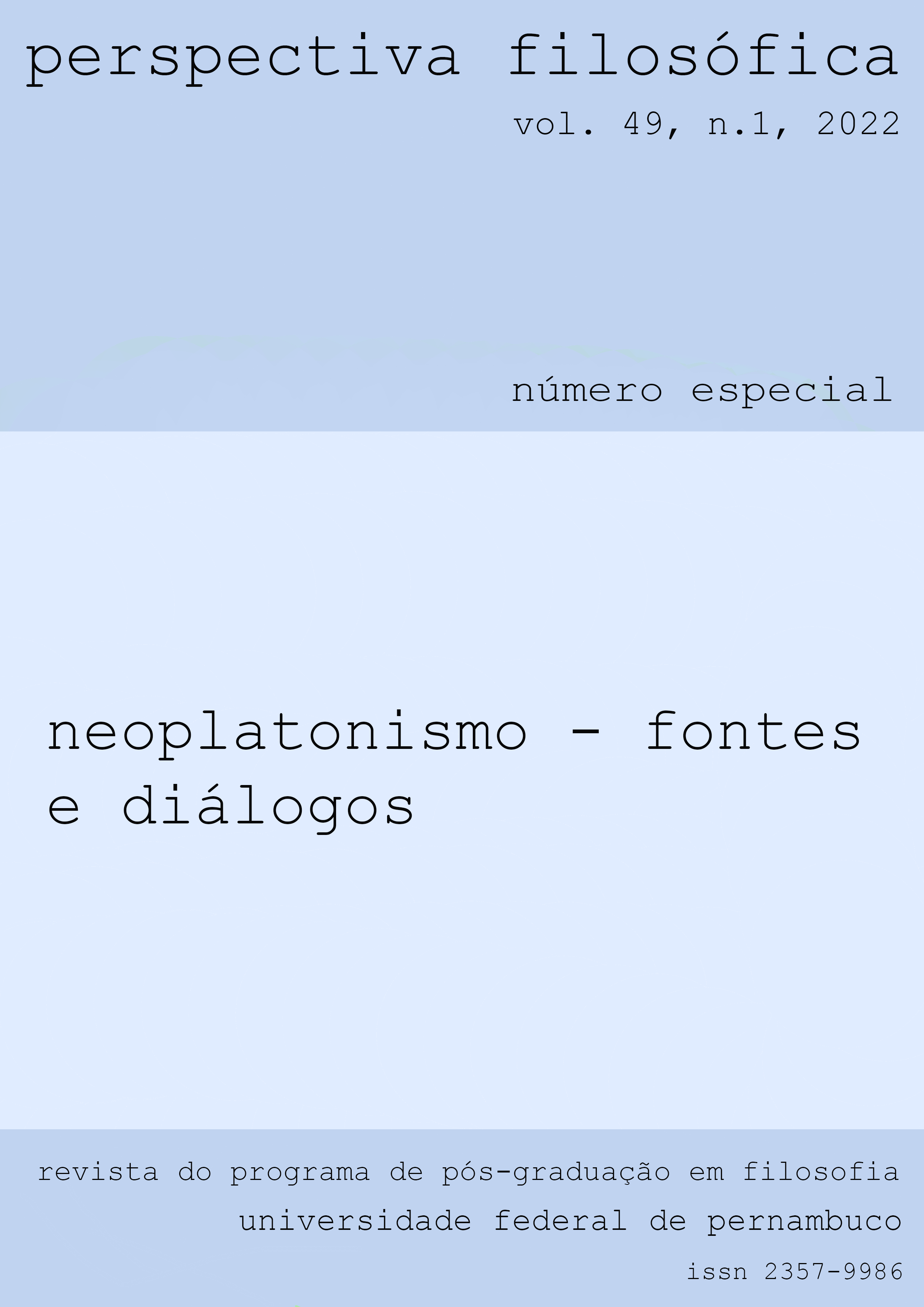Contemplation and Production of Nature in Plotinus
DOI:
https://doi.org/10.51359/2357-9986.2022.253137Keywords:
Plotinus, nature, contemplation, productionAbstract
My purpose is to examine the Plotinian conception of nature, the lower portion of the soul, whose function is to inform and give life to the sensible world. As Plotinus insists, especially in the treatise III 8 [30], “On contemplation”, nature produces by contemplation, that is, by a kind of cognitive activity that is different from those of the intellect and the higher soul. This cognitive activity, which excludes all reasoning and deliberation, consists of a certain type of self-perception or consciousness. Nature produces because it is logos, a rational formative principle that transmits to what is inferior the intelligible forms it receives from the higher soul, whose archetypes are the contents of the intellect. Nature is a logos that produces other logos, last and devoided of productive power; it is a productive power that contains, deployed, the formal principles that it transmits as reflections or images on matter, thus shaping sensitive entities, without becoming immanent to them.References
ATKINSON, Michael. Plotinus: Ennead V. 1 On the Three Principal Hypostases. A Commentary with Translation by M. Atkinson. Oxford; Clarendon Press, 1983.
BRÉHIER, Émile (1923-1938), Plotin, Ennéades, éd. et trad. par ---, Paris, Les Belles Lettres, 7 vols. Plotin Ennéades III 1956
CHIARADONNA, Riccardo. Sostanza, movimento, analogia. Plotino critico di Aristotele. Napoli: Bibliopolis, 2002.
CHIARADONNA, Riccardo. Plotino. Roma: Carocci, 2009.
EMILSSON, Eyjólfur Kjalar. Plotinus on Intellect. Oxford: Clarendon Press, 2007.
FATTAL, Michel. Logos et image chez Plotin. Paris: L’Harmattan, 1998.
GERSON, Lloyd. “Plotinus on logos”. In: WILBERDING, James and HORN, Christoph (eds.). Neoplatonism and the Philosophy of Nature. Oxford: Oxford University Press, 2012, p. 17-29.
HEISER, John. Logos and Language in the Philosophy of Plotinus. Lewinson, New York: The Edwin Mellen Press, 1991.
HENRY, Paul et SCHWYZER, Hans-Rudolph (ed.). Plotini Opera. 3 vols. (editio minor). Oxford: Clarendon Press, 1964-82.
IGAL, Jesús (trad.). Plotino Enéadas III-IV. Introducciones, traducciones y notas de J. Igal. Madrid: Gredos, 1985.
KALLIGAS, Paul. The Enneads of Plotinus. A Commentary. Vol. I, Traducción: Elizabeth Key Fowden & Nicolas Pilavachi. Princeton: Princeton University Press, 2014.
MORAU, Joseph. Plotin ou la gloire de la philosophie antique. Paris: Vrin, 1970.
MOREL, Pierre-Marie. “Comment parler de la nature? Sur le Traité 30”. Les études philosophiques, n. 90, 2009/3, p. 387-406.
MOREL, Pierre-Marie. Plotin. L’Odissée de l’âme. Paris: Armand Collin, 2016.
NARBONNE, Jean-Marc. Plotin. Oeuvres complètes. Tome I, Volume I. Introduction par J.-M. Narbonne avec la collaboration de M. Achard. Traité 1 (I 6), Sur le beau. Texte établi par L. Ferroni. Introduit, traduit et annoté par M. Achard et J.-M. Narbonne. Paris: Les Belles Lettres, 2014.
O’BRIEN, Denis. Plotinus on the Origin of Matter. An exercise in the interpretation of the Enneads. Napoli: Bibliopolis, 1991.
PERL, E. (2015), Plotinus, Ennead V.1 On the Three Primary Levels of Reality. Translation with Introduction and Commentary by---, Las Vegas-Zurich-Athens, Parmenides Publishing.
PIGLIER, Agnès. “De la possibilité ou de l’impossibilité d’un Logos hénologique”. In: FATTAL, Michel (dir.). Logos et langage chez Plotin et avant Plotin. Paris: l’Harmattan, 2003, p. 189-209.
REMES, P. Plotinus on Self. Cambridge: Cambridge University Press, 2007.
RIST, John M. Plotinus. The Road to Reality. Cambridge; Cambridge University Press, 1967.
ROLOFF, Dietrich. Plotin. Die Grossschrift III,8 –V,8 –V,5 –II,9. Berlin: Walter de Gruyter, 1970.
ROSSI MONTI, Martino. “Un filosofo mancato. Aporie della concezione plotiniana della natura”. In: LA VERGATA, Antonello. Nature. Studi su concetti e immagini della natura. Pisa: Edizioni ETS, 2014, p. 13-48.
SANTA CRUZ, María Isabel. “Intorno al concetto di natura in Plotino”. Philosophia, revue du Centre de Recherche sur la Philosophie Grecque de l’Académie d’Athènes, v. 49, 2019, p. 223-235.
SCHLETTE, Heinz Robert. Das Eine und das Andere. Studien zur Problematik des Negativen in der Metaphysik Plotins. München: Hueber, 1966.
SCHROEDER, Frederic. “Synousia, Synaisthaesis and Synesis: Presence and Dependence in the Plotinian Philosophy of Consciousness”. Aufstieg und Niedergang der Römischen Welt, v. 36. Berlin: Walter de Gruyter, 1987, pp. 677-699.
SCHWYZER, Hans Rudolph. “Bewusst und Umbewusst bei Plotin”. In: Entretiens Hardt, t. V, Les sources de Plotin. Genève-Vandoeuvres : Fondation Hardt, 1960, p. 341-378.
SOLMSEN, F., “Nature as Craftsman in Greek Thought”. Journal of the History of Ideas, XXIV, 1963, p. 473-496.
TAORMINA, Daniela. “Il corpo, la luce e l’insieme dei due. Una proposta esegetica di Plotino, enn. I 1 [53], 6, 14–7, 6. In: HORN, Cristoph und TAORMINA, Daniela (ed.). Körperlichkeit in der Philosophie der Spätantike. Corporeità nella filosofia tardoantica. Sankt Augustin: Academia Verlag, 2020, p. 17-42.
TAZZOLIO, Florent. “Logos et langage comme liens à l’Origine dans l’hé- nologie plotinienne”. In: FATTAL, Michel (dir.). Logos et langage chez Plotin et avant Plotin. Paris: l’Harmattan, 2003, p. 161-188.
VIOLETTE, R., “Les formes de la conscience chez Plotin”, en Revue des études grecques 107, 1994, p. 222-237.
WARREN, Edward. “Consciousness in Plotinus”. Phronesis, v. IX, 1964, p. 83-97.
WILDBERG, Christian. “A world of thoughts: Plotinus on nature and contemplation (ENN. III.8 [30] 1-6)”. In: CHIARADONNA, Riccardo and TRABATTONI, Franco (ed.). Physics and Philosophy of Nature in Greek Neoplatonism. Leiden-Boston: Brill, 2009, p. 121-143.
WILBERDING, James. “Automatic Action in Plotinus”. Oxford Studies in Ancient Philosophy, vol. XXXIV, 2008, p. 373-407.
Downloads
Published
Issue
Section
License
A Revista Perspectiva Filosófica orienta seus procedimentos de gestão de artigos conforme as diretrizes básicas formuladas pelo Conselho Nacional de Desenvolvimento Científico e Tecnológico (CNPq). http://www.cnpq.br/web/guest/diretrizesAutores que publicam nesta revista concordam com os seguintes termos:
Os autores mantém os direitos autorais e concedem à revista o direito de primeira publicação, sendo o trabalho simultaneamente licenciado sob https://creativecommons.org/licenses/by/4.0/deed.pt_BR que permite o compartilhamento do trabalho com reconhecimento da autoria e publicação inicial nesta revista.
Os autores têm autorização para assumir contratos adicionais separadamente, para distribuição não-exclusiva da versão do trabalho publicada nesta revista, com reconhecimento de autoria e publicação inicial nesta revista (Consultar http://opcit.eprints.org/oacitation-biblio.html).

Esta revista está licenciada com uma Licença Creative Commons Atribuição 4.0 Internacional.













